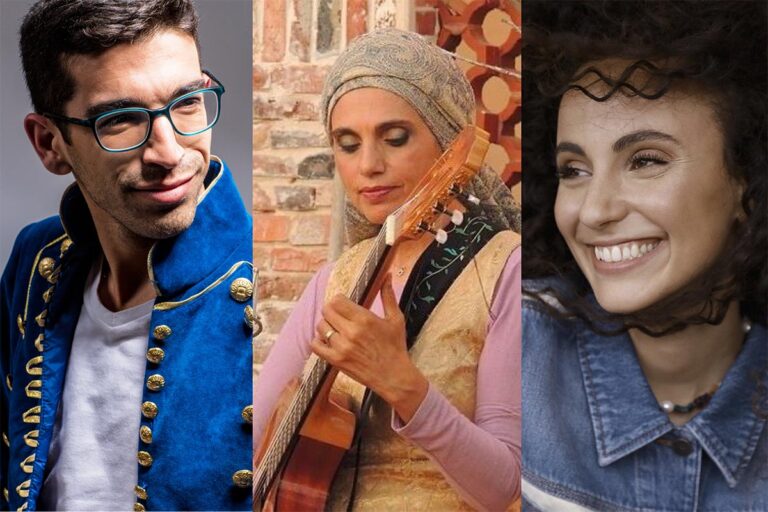
Calling Israel a “Jewish State,” with nearly 75% of its population being Jewish, might suggest Israelis share a great deal in common. But Jewish Israelis are very diverse, culturally and politically and religiously.
Although Israel’s diverse population poses challenges to forging a unified national identity, one place where many Israeli Jews come together to bridge these divides is through music that uses traditional sources like biblical quotes and piyyutim (religious poems) sung in synagogues.
Such music draws people of all religious orientations from secular to Orthodox, and from all backgrounds, including Ashkenazi, Sephardic and Mizrahi.
To introduce you to this musical style, here are seven Israeli artists who are bridging the religious-secular divide with the best music samples. This is not a bad start for your Israeli music playlist.
Arik Einstein, founding figure of Israeli pop
Arik Einstein was one of the founding figures of Israeli pop and is often considered the greatest and most popular Israeli singer of all time.
Despite his modest and unassuming presence, his stature is iconic. He’s been called me’ahev hamedinah, or “the paramour of the state.”
Prominent music critic Yoav Kutner summed up the central place he holds in Israeli culture: “Arik Einstein is more than the greatest Israeli artist of all time. Einstein is the real Israel himself.”
Born in Tel Aviv to a secular Ashkenazi family in 1939, nearly 10 years before statehood, he was a prolific recording artist who released or contributed to 34 albums and around 500 songs.
In 1971, a time when the Israeli music industry was heavily dominated by Ashkenazi artists and styles, Einstein recorded the delightful “Shir Mispar Shmoneh” (“Song Number Eight”).
Yankele Rothblit’s lyrics paraphrase Shir Hashirim (Song of Songs). Miki Gavrielov composed music with a Middle Eastern sensibility and Einstein’s vocals mimic a Yemenite Hebrew accent.
Ehud Banai, weaver of East and West
Ehud Banai has been a key figure in Israeli music since the 1980s. His family, of Persian descent, has produced some of Israel’s top entertainers in music, comedy, and on the stage.
One of his first hits, released in 1987, was “Egel Hazahav” (“The Golden Calf”), a protest song that uses the story from Exodus to address the frustrations of many Israelis at the time. The song is about a lack of leadership, symbolized by Moses’ absence on Mount Sinai while the people, who have lost their way, dance around an idol.
Although he has become more religiously observant over the years, an Ehud Banai concert today draws teenagers and seniors, strict Orthodox and secular Jews, Ashkenazi and Mizrahi fans. It’s one of the most diverse experiences one can have in Israel.
His song “David VeSha’ul” tells the story of Saul and David’s stormy relationship:
While many of his songs have a prayerful quality, he also released an entire album of sacred music in 2008 called “Shir Hadash” (“A New Song”).
Here’s one example from the album, “Odeh l’El” (“Thanks to God”). The piyyut featured in the song urges us to remain aware of our souls and keep them pure: “I thank the God who probes all hearts when stars sing in the morning.”
Berry Sakharof, from punk to medieval poetry
Berry Sakharof was born in Turkey to a family of Sephardic Mountain Jews from the Caucasus and arrived in Israel with his family at the age of three.
He began his career with a post-punk/early indie band, based in Belgium, called Minimal Compact. Singing in English, they were the first Israeli band to achieve significant international success.
When they broke up, Sakharof returned to Tel Aviv and began composing songs in Hebrew. His 2009 album “Adumei Hasefatot” (“Red of Lips”) is entirely comprised of poems by the medieval Spanish poet Solomon ibn Gabirol.
The songs are set to melodies that blend Eastern and Western traditions with a unique rock sensibility. While he continues to engage with traditional Jewish sources, he remains secular.
Etti Ankri, singer of the Jewish Golden Age of Spain
Sakharof is not the only contemporary musician to use Hebrew poetry from medieval Spain as lyrics. Etti Ankri, born in Lod to a Tunisian Jewish family, became one of Israel’s most popular singers in the 1990s.
She began participating in national song competitions while in high school. Although she began her IDF service in the Defense Ministry, her talent was noticed and she was transferred to the Education Corps Band. After her service, she began a wildly successful recording career.
In 2009, she recorded an album using Yehuda Halevi’s piyyutim called “Beshirei Rabi Yehuda Halevi” (“From the Poems of Rabbi Yehuda Halevi”).
Her rendering of “Mi Yitneni” (“Who Will Give to Me?”), like many songs on the album, has a beautiful Spanish lilt. Listen to it here:
Shuli Rand, the “pop Hasid”
The Haredi (ultra-Orthodox) community typically shies away from participating in the Israeli music scene, due to its adherence to strict gender divisions.
But Haredi actor and singer Shuli Rand scored a huge hit with his song “Ayeka” (“Where Are You”), using the term that God uses when he calls to Adam in Eden after the first humans eat the forbidden fruit.
Having been raised in a Modern Orthodox home, he left religion behind after high school and lived a completely secular life for 14 years, developing a successful career as an actor.
When he returned to religion, he found his way to mystical Breslover Hasidism. The lyrics of “Ayeka” reflect his path of searching and questioning in a poignant attempt to speak to God: “Voices from the past whisper that I should stop, but I keep on wading through the darkness and ask and seek where are you?”
Yuval Dayan, Israeli pop star
As a teenager, Yuval Dayan was leading the competition in the first season of “The Voice: Israel” when she unexpectedly announced that she was leaving the show.
Her magical voice was so special that she’d already been offered a recording contract. Growing up in a traditional Moroccan family from Ashdod, she developed a love of Jewish sources.
Dayan, who has become more religiously observant over the years, sparked controversy last year when she declined to shake hands with visiting President Joe Biden on religious grounds.
The title song of her 2016 album, “Libi Er” (“My Heart is Awake”), is from Shir HaShirim (Song of Songs).
In 2020, the pop star released the video for her song, “SheRak Techayech,” (“May You Just Smile”), which has over 36 million views on YouTube as of the time of writing. The lyrics, released during the pandemic, address themes of love and cherishing the simple things in life.
Hanan Ben Ari, the soulful Jewish pop star
Hanan Ben Ari, one of Israel’s foremost singers today, grew up in a religious household in the West Bank settlement of Karnei Shomron.
He began to write music at age 13, influenced by his father who was a cantor. His lyrics frequently invoke his Sephardic/Mizrahi heritage, and blend universal themes with the language of prayer and the Bible, allowing his music to appeal to secular and religious Israelis alike.
One of his biggest recent hits is a power anthem released in 2021 called “Holem Kmo Yosef” (“Dream Like Joseph”):
The lyrics argue that every story in the Bible reflects universal experiences: “Everyone leaves his father’s home, everyone nearly sacrifices his child, deep within is a little Sodom that he wishes to erase already, and angels will rescue him.”
Originally Published Apr 25, 2023 03:23PM EDT
